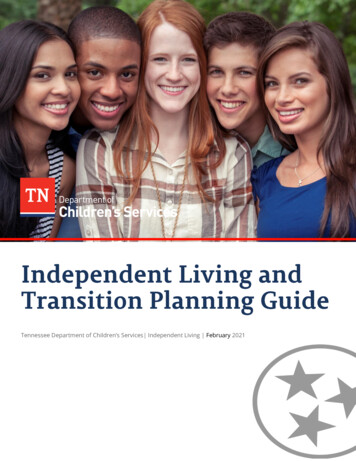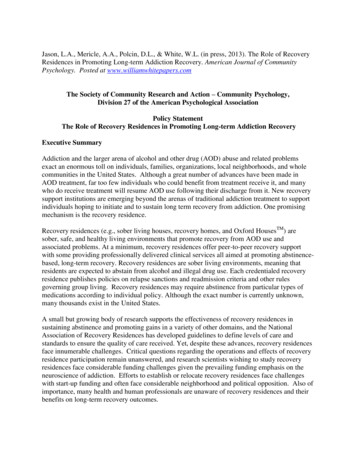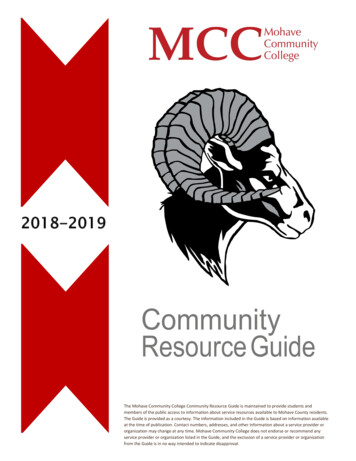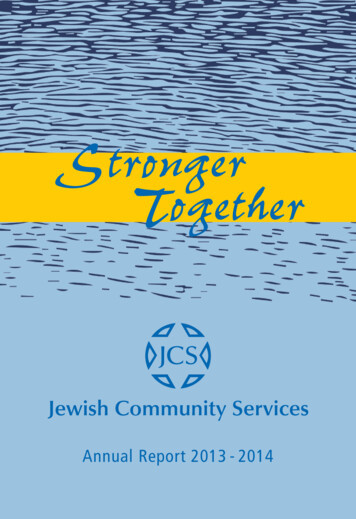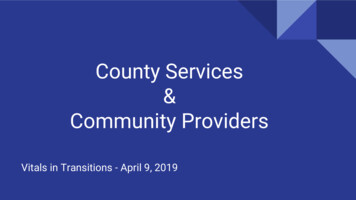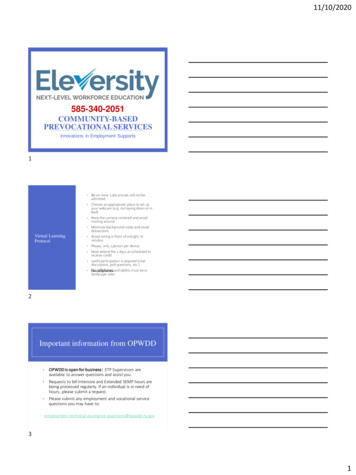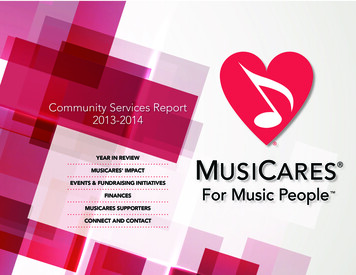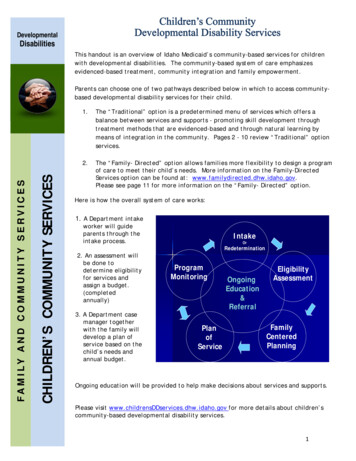
Transcription
Children’s CommunityDevelopmental Disability ServicesDevelopmentalDisabilitiesThis handout is an overview of Idaho Medicaid’s community-based services for childrenwith developmental disabilities. The community-based system of care emphasizesevidenced-based treatment, community integration and family empowerment.CHILDREN’S COMMUNITY SERVICESF A M I LY A N D C O M M U N I T Y S E R V I C E SParents can choose one of two pathways described below in which to access communitybased developmental disability services for their child.1.The “Traditional” option is a predetermined menu of services which offers abalance between services and supports - promoting skill development throughtreatment methods that are evidenced-based and through natural learning bymeans of integration in the community. Pages 2 - 10 review “Traditional” optionservices.2.The “Family- Directed” option allows families more flexibility to design a programof care to meet their child’s needs. More information on the Family-DirectedServices option can be found at: www.familydirected.dhw.idaho.gov.Please see page 11 for more information on the “Family- Directed” option.Here is how the overall system of care works:1. A Department intakeworker will guideparents through theintake process.IntakeOrRedetermination2. An assessment willbe done todetermine eligibilityfor services andassign a budget.(completedannually)3. A Department casemanager togetherwith the family willdevelop a plan ofservice based on thechild’s needs andannual nningOngoing education will be provided to help make decisions about services and supports.Please visit www.childrensDDservices.dhw.idaho.gov for more details about children’scommunity-based developmental disability services.1
Table of ContentsPageTraditional Option . . . .3State Plan . . .4Respite . . 4Habilitative Support . . .5Family Education . .6Waiver Services . . . .7Habilitative Intervention. . .7Family Training . .8Interdisciplinary Training . . .8Therapeutic Consultation . . .9Crisis Intervention Services . . .11Reimbursement Rates for Traditional Services . 12Family-Directed Services Option . . . . 132
TRADITIONAL PLAN OPTIONThe next several pages highlight Idaho Medicaid “Traditional” option community-based servicesfor children with developmental disabilities. A complete description of services can be found inIDAPA 16.03.10 “Medicaid Enhanced Plan Benefits”.A child will qualify for one of two benefit packages based on eligibility and assessmentinformation gathered. These benefit packages are called the “state plan” and “waiverservices”. All children that meet the eligibility criteria for a developmental disability will qualifyfor “state plan - home and community based services (HCBS)” including respite,habilitative supports and family education. Children who meet “institutional level of care” will qualify for “waiver services”.“Waiver services” include all “state plan” services, plus habilitative intervention,family training, interdisciplinary training, therapeutic consultation, and crisisintervention.Additionally, all children with developmental disabilities continue to be eligible foroccupational, physical and speech/language therapy services and other Medicaid medicalservices. These services are not part of the children’s community developmental disabilityservices described in this handout and do not need to be included in a child’s annualcommunity services ‘budget’.STATE PLAN SERVICESRespite“Respite gives Mom and Dad achance to take a needed break ”Respite provides for the supervision of achild to allow the primary caregiver occasionalshort-term relief.Caring for a child with a disability can be overwhelming at times. Respite services are a meansfor parents to take a break by providing supervision for a child on an occasional or short-termbasis. Respite can be set up on a regular basis or can be used when there is a familyemergency. For example, respite can be used for a regularly scheduled “date night” for mom3
and dad or when the family needs to spend time with another family member that ishospitalized. The goal is to provide relief for the caregiver and reduce stress.There are two types of respite providers. One type is employed by a developmental disabilityagency (DDA) the other is an independent respite provider who has entered into a provideragreement with Medicaid. The independent respite provider must be at least 18 years of ageand have a high school diploma or GED. The independent respite provider is a means for afamily to pay a trusted friend or neighbor for caring for their child. The respite DDA providermust be at least 16 years of age because they are directly supervised by a DDA. Both types ofrespite providers must have received training in the needs of the child and be able to performthe duties required in a Plan of Service for the child.Certain restrictions apply with respite care. If the child is on the Act Early waiver, the respiteservice costs cannot exceed 10% percent of the child’s overall budget amount.Respite cannot be: used as payment for room and boardused with paid caregiversdelivered in order to allow the parent to work used for over 14 consecutive daysprovided at the same time as otherMedicaid servicesRespite can only be offered in a group when the service is through a DDA:Center-based: a minimum of 1 staff to every 6 children.Community-based: a minimum of 1 staff to every 3 children.Staff to child ratio shall be adjusted according to the number of children in the group withsignificant functional impairments or behavioral issues.Respite through a DDA can be offered at the DDA, in the community or in the child’s home.Respite through an independent provider can be offered in the community or in the child’shome.Habilitative SupportsHabilitative Support helps a child become moreindependent and integrated in their pportunities to explore their interests by providingthe supports necessary to participate in communityactivities and events. This could include anythingfrom attending Girl Scout camp once a year to weeklySunday school. Habilitative support provides avariety of learning opportunities for children to interact with others in typical communityactivities. It also promotes a proven teaching method – peer modeling. Children will learn4
through watching their peers and seeing how others behave (appropriately). This will promotelearning new things in the community setting while having fun! They also gain opportunities toimprove and practice skills learned in other therapeutic environments.Children learn from Children: Integration provides many opportunities for learning throughpeer modeling. These opportunities may include such things as increasing skills related tofollowing directions, seeing others that are dressed and groomed well, using appropriatemanners, and being engaged in activities associated with proper use of utensils at a meal, etc.Habilitative support provides opportunities to reinforce all types of skills such as maintenanceof mobility, sensory-motor, communication, social, personal care and relationship building. Itshould provide opportunities for a variety of leisure activities such as going to a theatre, buyinga movie ticket and buying popcorn and soda, etc.For Habilitative supports to occur, it must first be identified as a goal on the child’s plan ofservice. The activities or events must not replace services such as school or therapy that iscurrently being provided in another environment and must not supplant the role of the primarycaregiver. The activities must be age-appropriate with typically developing peers.Providers of habilitative supports must be at least 18 years of age, be high school graduates (orhave a GED), and have six-months supervised experience working with children withdevelopmental disabilities. Additionally, staff must complete a required training (currentlyapproximately 3 hours) focusing on inclusion.Family EducationThrough Family Education, parents canlearn about disability issues andtreatment strategies for their child.Family Education is a teaching service available to help families better meet the needs of theirchild by providing education on their child’s needs that have been identified on the plan ofservice. This service is provided by trained professionals on issues as broad as an orientation ondisabilities and as narrow as the use of adaptive seatbelts or intervention strategies on the planof service.Family Education can also include helping the parent educate other unpaid caregivers regardingthe needs of the child. Providers of family education are required to maintain documentationof the training in the child’s records indicating the activities that are stated in the plan ofservice are being implemented.There is a maximum group ratio of 5 families per class.professional requirements of a habilitative interventionist.The provider must meet the5
WAIVER SERVICESHabilitative InterventionHabilitative Intervention services improve children’sfunctional skills and discourage problem behavior.Intervention services are outcome-based, therapeutic servicesdelivered by a professional. Services include individual orgroup behavioral interventions and skill developmentactivities.Habilitative Intervention must be based upon well-known andwidely regarded principles of evidence-based treatment(EBT).EBT is the use of intervention methods that research hasshown effective as treatment for specific problems.1. Develop Functional, Adaptive Skills. When goals to address skill development areidentified on the plan of service, the intervention must provide for the acquisition offunctional skills such as riding the bus, cooking, banking, dressing, keeping a scheduleand community safety skills.2.Diminish Maladaptive Behaviors. When goals to address maladaptive behavior areidentified on the plan, the intervention must include the development of replacementbehavior/skills rather than merely the elimination or suppression of maladaptivebehavior that interferes with the child’s overall general development, community andsocial participation.Habilitative intervention can be conducted in a child’s home, in community settings or at theDDA. It can be one-on-one with a child or in a small group of up to 3 children. Staff to childratio shall be adjusted according to the number of children in the group with significantfunctional impairments or behavioral issues.When group intervention is community-based, children must be integrated in the community ina natural setting with typically-developing peers. Group intervention must be directly relatedto meeting the needs of the child, and be identified as an objective in accordance with a plangoal. Providers of Habilitative Intervention must have a bachelor’s degree in a human servicefield including certain child-related course content and one year’s experience working with thepopulation.6
Family TrainingResearch shows that family training andinvolvement makes an amazing difference in therate of progress.Family Training is instruction provided on a‘one-on-one’ basis to families by a trainedprofessional on treatment strategies.This service allows a professional to meet with the family to help them with the interventiontechniques that are being used with their child.The child must be present when Family Training is provided so the trainer can demonstrateintervention techniques and strategies. Additionally, Family Training is required for all parentsof children receiving Habilitative Intervention. If the child is on the Act Early Waiver, theparent will need to be physically present at the intervention session a minimum of 20% of thetime in which Habilitative Intervention is being provided to receive family training. This is avery important requirement and is part of the Idaho IDAPA rules that allow for this type ofeducation for children on the Act Early Waiver.Interdisciplinary TrainingCollaborationInterdisciplinary Training encourages collaboration by allowing two providers to bill at the sametime under certain circumstances, allowing one professional to bill Interdisciplinary Trainingand one professional to bill for the direct service being provided.Interdisciplinary Training is only provided during the time in which support or interventionservices are being provided to the child. With Interdisciplinary Training, the DDA staff and thechild’s OT, PT or SLP should be able to collaborate in order to reinforce each other’s goals andobjectives and eliminate therapy that is inconsistent and not complimentary of one another.Interdisciplinary Training can be provided on topics such as health and medication monitoring,positioning and transfers, intervention techniques, positive behavior supports and the use oftherapeutic equipment. The child must be present when the interdisciplinary training is beingprovided to the direct service provider.7
Interdisciplinary Training between a Habilitative Interventionist and a Therapeutic Consultant isnot a reimbursable service. Interdisciplinary Training between employees of the samediscipline is also not a reimbursable service.The Interdisciplinary Training provider is required to maintain documentation of the training inthe child’s records indicating the activities were provided as stated in the plan of service.Occupational Therapists, Physical Therapists, Speech-Language Pathologists, Practitioners ofthe Healing Arts, Habilitative Intervention providers and Therapeutic Consultants may bequalified to provide interdisciplinary training.Therapeutic ConsultationTherapeutic Consultation is anopportunity to consult with the experts ina field when treatment isn’t working.When a child receiving Habilitative Intervention is not demonstrating expected outcomes and itis anticipated that a crisis event may occur without the consultation service, TherapeuticConsultation can be used to bring in an expert in the field to consult on the treatment plan.A Therapeutic Consultant has advanced expertise and experience to address complex needsthat have not been successfully mitigated in Habilitative Intervention. These could includesevere aggression, self-injury or other dangerous behaviors that require more aggressive effortsin training and assistance. There could also be a risk of a crisis unless the consultative servicesare acquired.The Therapeutic Consultant can: Develop and oversee a “positive behavior support” plan. Positive behavioral supportsare intervention strategies used to reduce or prevent problem behaviors by replacingthem with socially-appropriate behaviors.Provide advanced types of assessments to help determine what training andassistance is needed to address the complex needs.Monitor the progress and coordination and implementation of the plan acrossvarious environments such as the home or the community, orProvide consultation to other service providers and families.Certain limitations are in effect for Therapeutic Consultation. Therapeutic Consultation cannotbe provided as a direct intervention service, it is a consultative service. A child must bereceiving Habilitative Intervention services prior to consideration of a Therapeutic Consultation,with the exception of crisis situations. Additionally, Therapeutic Consultation is limited to 18hours per year per child and must be prior authorized by the child’s case manager.8
Crisis Intervention ServicesA crisis is defined as an unanticipated event,circumstance or life situation that places a child with adevelopmental disability at risk of at least one of thefollowing: Hospitalization; Loss of housing; Loss of employment; Being arrested or incarcerated; or Physical harm to self or others, including familyaltercation or psychiatric relapse.Crisis Intervention can help prevent or avert a community placement and guide families andservice providers in situations where risk to the health and safety of the child exists or there isthe potential for a crisis to occur.Crisis Intervention Professionals provide consultation services, such as training and staffdevelopment to help address the child’s needs. Crisis intervention professionals must meet theminimum Therapeutic Consultation provider qualifications.An Emergency Intervention Technician provides emergency back-up or direct support, such ascrisis intervention services in the home or community on a short term basis, not to exceed 30days. An out-of-home cannot exceed 14 days and must be pre-authorized by the Department.Emergency Intervention Technician providers must meet the same minimum qualifications as ahabilitative support provider.Crisis intervention can be requested retroactively when a crisis has already occurred and therewere no other supports available for the child during the time of the crisis. The request mustbe made to the Department within 72 hours of the services being provided. If the child stayingat home creates a dangerous situation for themselves, the family, or both, the provider canrequest short-term placement out of the home for the child - this requires prior authorizationby the Department.Positive behavioral interventions (intervention strategies that are developed and implementedto prevent problem behavior with alternative behaviors that are socially appropriate) must beused prior to, and along with, the use of any restrictive interventions. Crisis interventionservices can also be provided for a child in a crisis situation via tele-health resources.All children on the Traditional option are eligible for crisis services.Crisis services are not deducted from a child’s annual budget.9
Children’s Benefit RedesignSummary of Children’s Developmental Disabilities Service RatesLine ItemNew Service DescriptionRateHourly Rate1Respite‐Individual 3.46 13.842Independent Respite – Individual 2.05 8.203Respite – Group 1.50 6.004Habilitative Supports – Individual 5.01 20.045Habilitative Supports – Group 2.14 8.566Habilitative Intervention Assessment 11.35 45.407Habilitative Intervention – Individual 11.35 45.408Habilitative Intervention – Group 4.56 18.249Therapeutic Consultation 16.20 64.8010Independent Therapeutic Consultation 16.20 64.8011Family Education 11.35 45.4012Family Training 11.35 45.4013Interdisciplinary Training 11.35 45.4014Crisis Intervention – Technician 5.39 21.5615Crisis Intervention – Professional 16.20 64.8016Independent Crisis Intervention – Professional 16.20 64.8010
The “Family Directed” option offers parents of children with developmental disabilities more choiceand flexibility in purchasing the services their children need. Using the child’s individualized budgetassigned during the annual assessment, a family can plan a year of therapy, services and goods toenable their child to live a full and inclusive life.The flexibility in the Family Directed option allows parents to design and direct services outside ofthe traditional menu of services, within guidelines. Families are able to contract with nontraditional and traditional service providers with the skills, experience and qualifications desired bythe family.The Family Directed pathway allows for creative and innovative ways to access services while stillmaintaining accountability required by federal authorities.FAMILY-DIRECTED SERVICES MAY BE RIGHT FOR YOU IF: You are willing to invest the time involved in administrating the FDS program. You understand and assume the responsibilities in administering the FDS program. You would like to gain more control over the resources that are available for your child. You want to manage an individualized budget based on your child’s assessed needs. Y
This handout is an overview of Idaho Medicaid’s community-based services for children with developmental disabilities. The community-based system of care emphasizes . Habilitative intervention can be conducted in a child’s home, in community settings or at the DDA. It can be one-on-one with a child or in a small group of up to 3 children.
